Ford Ranger vs Volvo XC60 – Differences & prices compared
Compare performance, boot space, consumption and price in one view.
Find out now: which car is the better choice for you – Ford Ranger or Volvo XC60?
The Ford Ranger (Pickup) comes with a Diesel, Petrol or Plugin Hybrid engine and Manuel or Automatic transmission. In comparison, the Volvo XC60 (SUV) features a Petrol MHEV or Plugin Hybrid engine with Automatic transmission.
When it comes to boot capacity, the Ford Ranger offers , while the Volvo XC60 provides 483 L – depending on how much space you need. If you’re looking for more power, decide whether the 292 HP of the Ford Ranger or the 455 HP of the Volvo XC60 suits your needs better.
In terms of consumption, the values are 3.10 L per 100 km for the Ford Ranger, and 2.80 L for the Volvo XC60.
Price-wise, the Ford Ranger starts at 34500 £, while the Volvo XC60 is available from 49200 £. Compare all the details and find out which model fits your lifestyle best!
Ford Ranger
The Ford Ranger stands out in the pickup market with its robust build and versatile capabilities, making it a popular choice for both work and leisure. Its modern design is complemented by a well-equipped interior, providing comfort and advanced technology. Whether tackling challenging terrains or cruising through the city, the Ranger delivers a reliable and dynamic driving experience.
details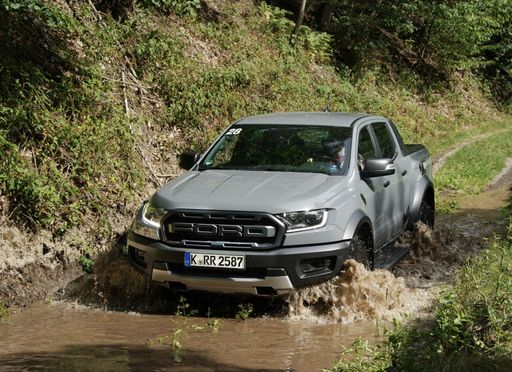 @ media.ford.com
@ media.ford.com
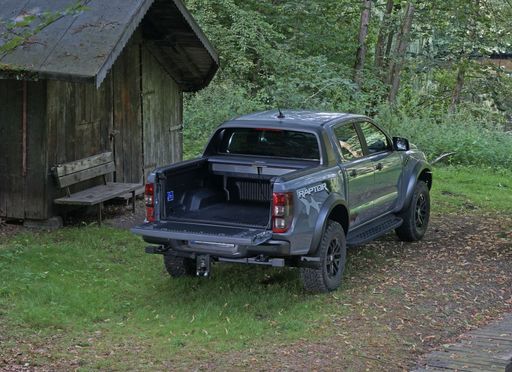 @ media.ford.com
@ media.ford.com
Volvo XC60
The Volvo XC60 strikes a perfect balance between contemporary design and practical functionality, making it an appealing choice for those in search of a reliable and stylish SUV. Its interior showcases a blend of high-quality materials and innovative technology, ensuring a comfortable and seamless driving experience. With its emphasis on safety and environmental sustainability, the XC60 continues to stand out in the competitive SUV market.
details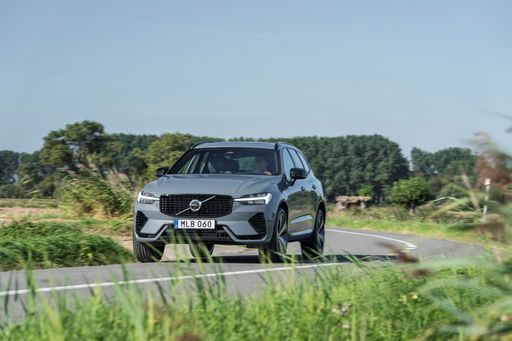 @ media.volvocars.com
@ media.volvocars.com
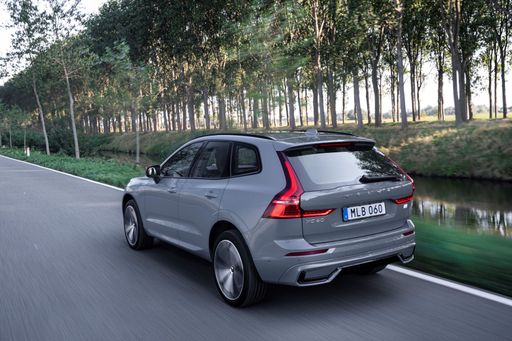 @ media.volvocars.com
@ media.volvocars.com
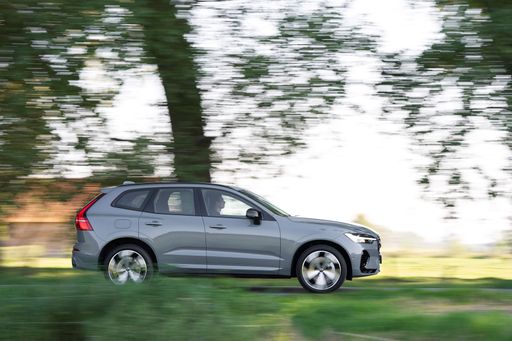 @ media.volvocars.com
@ media.volvocars.com
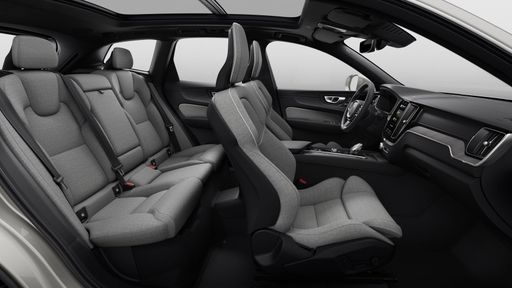 @ media.volvocars.com
@ media.volvocars.com
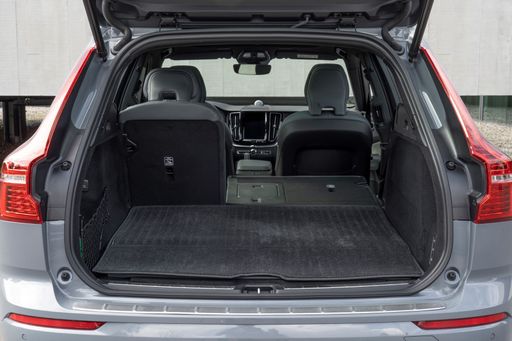 @ media.volvocars.com
@ media.volvocars.com

|

|
|
|
|
Costs and Consumption |
|
|---|---|
|
Price
34500 - 68800 £
|
Price
49200 - 75100 £
|
|
Consumption L/100km
3.1 - 13.8 L
|
Consumption L/100km
2.8 - 7.4 L
|
|
Consumption kWh/100km
-
|
Consumption kWh/100km
-
|
|
Electric Range
50 km
|
Electric Range
74 - 82 km
|
|
Battery Capacity
11.80 kWh
|
Battery Capacity
14.70 kWh
|
|
co2
70 - 315 g/km
|
co2
64 - 169 g/km
|
|
Fuel tank capacity
80 L
|
Fuel tank capacity
71 L
|
Dimensions and Body |
|
|---|---|
|
Body Type
Pickup
|
Body Type
SUV
|
|
Seats
2 - 5
|
Seats
5
|
|
Doors
2 - 4
|
Doors
5
|
|
Curb weight
2082 - 2486 kg
|
Curb weight
1900 - 2150 kg
|
|
Trunk capacity
-
|
Trunk capacity
468 - 483 L
|
|
Length
5370 - 5420 mm
|
Length
4688 - 4708 mm
|
|
Width
1918 - 1968 mm
|
Width
1902 mm
|
|
Height
1868 - 1922 mm
|
Height
1651 - 1658 mm
|
|
Payload
676 - 1108 kg
|
Payload
510 - 550 kg
|
Engine and Performance |
|
|---|---|
|
Engine Type
Diesel, Petrol, Plugin Hybrid
|
Engine Type
Petrol MHEV, Plugin Hybrid
|
|
Transmission
Manuel, Automatic
|
Transmission
Automatic
|
|
Transmission Detail
Manual Gearbox, Automatic Gearbox
|
Transmission Detail
Automatic Gearbox
|
|
Drive Type
All-Wheel Drive
|
Drive Type
All-Wheel Drive
|
|
Power HP
170 - 292 HP
|
Power HP
250 - 455 HP
|
|
Acceleration 0-100km/h
7.9 - 12.1 s
|
Acceleration 0-100km/h
4.9 - 6.9 s
|
|
Max Speed
180 - 190 km/h
|
Max Speed
180 km/h
|
|
Torque
405 - 697 Nm
|
Torque
350 - 709 Nm
|
|
Number of Cylinders
4 - 6
|
Number of Cylinders
4
|
|
Power kW
125 - 215 kW
|
Power kW
184 - 335 kW
|
|
Engine capacity
1996 - 2993 cm3
|
Engine capacity
1969 cm3
|
General |
|
|---|---|
|
Model Year
2022 - 2025
|
Model Year
2025
|
|
CO2 Efficiency Class
G, B
|
CO2 Efficiency Class
F, B
|
|
Brand
Ford
|
Brand
Volvo
|
Ford Ranger
A Comprehensive Look at the Ford Ranger: Versatility Meets Innovation
The Ford Ranger has long been a staple in the world of pick-up trucks, renowned for its robust design and versatility. Whether for rugged off-road adventures or everyday utility tasks, the Ford Ranger continues to be a frontrunner in the pick-up segment. In this article, we explore the technical details and innovative features that set the latest versions of the Ford Ranger apart from its competitors.
Powertrain Performance: A Range of Choices
The Ford Ranger offers a selection of powerful engines, catering to a diverse set of user requirements. Engine options range from the fuel-efficient 2.0-litre EcoBlue diesel engine to the robust 3.0-litre EcoBoost petrol engine, offering impressive outputs from 170 to 292 PS. These engines are paired with either a manual or an advanced automatic transmission, both providing smooth shifting and optimised performance across various driving conditions.
The Ranger’s all-wheel-drive system ensures a robust off-road capability while maintaining a composed ride on urban roads. With torque figures ranging between 405 Nm and 600 Nm, the Ranger guarantees ample pulling power whether you're on or off the beaten track.
Fuel Efficiency and Environmental Considerations
Recognising the importance of balancing performance with efficiency, the Ford Ranger delivers competitive fuel consumption figures ranging from 8.4 to 13.8 litres per 100 km. Despite its robust performance capabilities, the Ranger remains mindful of its environmental footprint, maintaining a functional balance between power and efficiency with a CO2 efficiency class of G.
Advanced Safety and Technology Features
Incorporating cutting-edge technology, the Ford Ranger is equipped with a suite of safety features designed to protect both passengers and payload. Among these are adaptive cruise control, lane-keeping assistance, and a pre-collision assist system, enhancing the driver's ability to navigate both rural roads and busy motorways safely and efficiently.
Moreover, the interior tech suite includes an intuitive infotainment system, complete with connectivity options for seamless integration of smartphones and smart devices. This ensures drivers and passengers can stay connected and entertained on all journeys.
Customisation and Comfort
The Ford Ranger offers a variety of trim levels, allowing customers to tailor the vehicle to their specific needs. From the rugged XL 4x4 to the luxurious Platinum e-4WD Automatik, there is a model to suit every preference and requirement. Equipment lines such as Wildtrak and MS-RT add enhanced styling and additional features for those seeking a more distinctive and upscale appearance.
Inside, the Ranger provides comfortable seating configurations for up to five passengers, with premium materials and ample storage space to ensure every journey is a pleasant experience. Users can also benefit from a range of comfort features, including climate control, premium audio systems, and adjustable seating.
Practicality Meets Payload
The Ford Ranger excels in practicality with its impressive payload capacity and spacious cargo bed, suitable for carrying everything from work equipment to recreational gear. With a maximum payload of up to 1,108 kg, the Ranger is more than capable of handling heavy loads, making it an ideal choice for both professional and personal use.
Additionally, the robust chassis and durable build quality provide long-lasting performance even under the most demanding conditions, ensuring reliability and endurance in the long term.
Conclusion: A Resilient Companion for All Terrains
With its capable engine choices, outstanding off-road capabilities, and a host of advanced features, the Ford Ranger continues to lead the way in the pick-up truck category. Whether for practical utility, adventurous pursuits, or simply as a reliable daily vehicle, the Ranger delivers on all fronts – a true testament to Ford’s commitment to innovation and quality in the automotive industry.
Volvo XC60
Introduction to the Volvo XC60
The Volvo XC60 continues to set the standard in the luxury SUV category, embodying a blend of Scandinavian design, cutting-edge technology, and robust performance. As one of Volvo's best-selling models, the XC60 delivers an exceptional driving experience characterized by its impressive powertrains and a suite of innovative features. This article delves into the technical intricacies and innovative advancements that define the Volvo XC60, highlighting why it remains a top choice for discerning drivers.
Performance and Powertrains
The Volvo XC60 offers a range of powertrains to suit diverse preferences, from the efficient mild-hybrid systems to the powerful plug-in hybrids. The mild-hybrid variants provide a balance of performance and fuel economy, generating up to 250 PS and achieving fuel consumption as low as 7.7 L/100km. Meanwhile, the plug-in hybrid models take efficiency to another level, offering up to 455 PS with remarkably low fuel consumption of just 0.9 L/100km and an electric range of up to 80 km.
Electric Innovation
Volvo’s commitment to sustainability is evident in the XC60's plug-in hybrid models, which offer a battery capacity of 14.7 kWh. This allows for significant electric-only driving, reducing emissions and providing a quieter ride. With a focus on reducing its carbon footprint, Volvo offers some versions with CO2 emissions as low as 22 g/km. The renowned Polestar Engineered package further enhances the driving dynamics, featuring sport-tuned suspension and increased power output.
Advanced Safety Features
Known for prioritising safety, Volvo integrates several advanced safety technologies into the XC60. Standard features include the City Safety suite, which incorporates collision avoidance and mitigation, along with pedestrian detection. The SUV is also equipped with Volvo's Pilot Assist system, an advanced driver assistance feature that aids steering, braking, and acceleration up to 130 km/h, ensuring a more relaxed drive on highways.
Interior Comfort and Technology
The XC60 doesn’t compromise on luxury, offering a spacious interior with high-quality materials and state-of-the-art technology. The standard Sensus infotainment system provides intuitive control over multimedia, navigation, and connected services. Features such as a panoramic sunroof and premium audio systems enhance comfort and driving pleasure, while the adaptive seats and climate control ensure a comfortable environment for all passengers.
Conclusion
The Volvo XC60 exemplifies a harmonious blend of style, technology, and sustainability. With its array of powertrains and cutting-edge features, it meets the needs of a broad range of drivers, maintaining Volvo’s reputation for safety and quality. Whether one opts for the fuel-efficient mild-hybrid or the powerful plug-in hybrid, the XC60 remains a formidable contender in the luxury SUV market, offering a driving experience that is both indulgent and responsible.
The prices and data displayed are estimates based on German list prices and may vary by country. This information is not legally binding.
